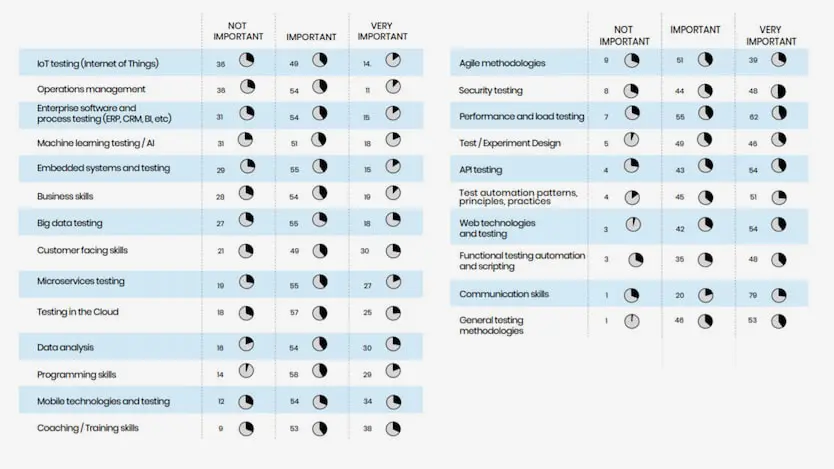
Quality assurance (QA) as a practice promotes better standards of product quality. It introduces frameworks for faster detection of defects and prevents bugs from slipping into the later stages of the SDLC.
Behind these practices stand Quality Assurance Engineers — specialists who ensure that all elements of your end product meet pre-established criteria and user expectations.
In pop culture, you may have seen Quality Assurance Engineers portrayed as pedantic folk whose main role is to meticulously nitpick every Software Developer’s move and break things along the way. Indeed, QA people like to “break”, but they also love to “build”.
In this post, we’ll break down what responsibilities Quality Assurance Engineers have and why having this role is vital for the project’s success.
What is a Quality Assurance (QA) Engineer?
A Quality Assurance Engineer is a specialist who promotes quality standards in the SDLC, monitors compliance with these standards, and detects software issues throughout the whole product lifecycle. They help establish quality assurance and quality control processes for the project.
Consider Quality Assurance Engineers as your project’s immune system. First and foremost, they aim to prevent defects from disrupting your software’s health (hence, establishing standards early on). However, if any issues arise, they reach out to the development team for remediation (hence, writing bug reports and monitoring if the system is functional, reliable, usable, etc.).
QA Engineers guarantee that the produced code and end product corresponds to quality requirements. They verify that the software functions well, meets user expectations, and does not have technical shortcomings.
To do so, they develop test plans and create defect reports, then advise the development team on how to solve the identified issues. But most importantly – their role is to promote efficient QA practices from project initiation up to release.
Such a quality-driven approach to software development encourages the whole team to be more mindful and deliberate while they deliver code. As a result, your Software Developers make fewer blunders and timely address defects if those happen to arise.
Core QA Roles, Responsibilities, and Skills
QA Engineer is an umbrella term that encompasses many roles, contributing to an efficient QA process:
- Software Test Engineers create test plans and cases, assess possible risks, detect defects, and report them to the development team.
- Automation Testers rely on various testing automation tools (e.g. Selenium) to streamline repetitive tasks, accelerate the testing process, and produce detailed reports on detected issues.
- Test Leads define QA processes, estimate, prioritize, and plan testing activities.
- Testing Analysts ensure that the development process, including test automation, aligns with the QA strategy and chosen development methodologies (such as Agile, Waterfall, Kanban). They also perform manual and automated testing if needed.
- Test Architects are senior professionals who suggest different approaches and techniques for effectively assessing different product areas.
Some companies tend to allocate all their QA/QC tasks to one or two available QA Engineers on the project. A bigger or more complex project, however, will require multi-pronged quality assurance practices. You’ll need QA Engineers with specialized skills and responsibilities, e.g., separate special people for manual testing (UX/UI), automation testing, and test strategy development and implementation.
QA Engineer’s Responsibilities
According to the State of Testing Report 2020, half of QA Engineers spend 75%-100% of their time exclusively testing software. Another 50% also takes on extra responsibilities such as:
- 51% perform technical writing
- 35% gather requirements
- 34% write user stories
- 25% help with customer support
- 20% write code.
QA Specialists’ responsibilities also vary depending on their specialization. One person cannot perform all types of QA tasks, especially when working with complex software systems. The division of responsibilities, especially when we talk about midsize to enterprise projects, results in better outcomes.
General QA Engineer Responsibilities
- Create test cases — descriptions of requirements to meet when testing specific feature or functionality
- Write test scripts — step-by-step instructions of how to perform a testing activity to meet the requirements
- Report bugs and define their possible causes
- Identify places where automated testing can be implemented
- Review design and UI components
- Review product documentation
- Define quality standards, metrics, and scoring parameters, using existing best practices
Automation Tester’s Responsibilities
- Implement and perform automated tests using test frameworks and tools
- Write and execute automation scripts
- Generate automated reports and create alert systems
- Implement simulation tools that mimic users’ behavior
- Document defects and issues with the application tested
Test Lead’s Responsibilities
- Create the QA plan and communicate it to the whole QA team
- Define QA processes to be performed during each stage of SDLC
- Provide feedback about tests to the development team
- Prioritize testing activities, create tasks and assign them to proper QA professionals
- Create manual and automated scripts
- Manage dependencies among QA Engineers
- Test coaching and consulting
Security Tester’s Responsibilities
- Plan and perform security tests (policy-based, risk-based, and standard-based)
- Simulate security threats to test a system for weak spots and vulnerabilities
- Create reports, based on the results of performed tests
- Consult Developers on available methods that help fix the detected security issues
Performance Tester’s Responsibilities
- Review requirements, focusing on the performance aspect of the application
- Test the application speed under different load levels
- Monitor the changes in the product’s response to different load levels over time
- Define performance metrics based on project requirements
- Implement performance test tools
Acceptance Tester’s Responsibilities
- Design acceptance tests
- Perform beta testing activities
- Replicate user behavior to check if the system meets business requirements
- Model business rules to check if the system meets business requirements
- Compare results to the stated project requirements and create reports based on them
Essential and In-Demand QA Skills
The level of skills differs among QA Engineers and defines their positions in the software development team. Just as with Developers, in this role, there is differentiation by Junior, Middle, and Senior QA Testers. This differentiation is based on the level of skills and years of experience. It also defines QA Engineers’ areas of responsibility, workload, and salary.
Here are key in-demand QA skills, important to a well-established quality assurance process:
- Knowledge of general testing methodologies
- Functional testing automation
- Web technologies and testing
- Test automation patterns, principles, and practices
- API testing
- Test/experiment design
- Performance and load testing
- Security testing
- Agile methodologies

Source: State of Testing Report 2020
QA Engineers also use tools that automate their tasks, increase productivity and enhance teamwork. Among the most useful tools for Testers are:
- Bug tracking tools (Bugzilla, Jira, Redmine), used by 76% of respondents.
- Agile Workflow tools (Trello, Jira Agile, etc), used by 56% of respondents.
- Source control systems (GitHub, BitBucket), used by 43% of respondents.
- Test or QA management tools (QC/ALM, TFS, PractiTest), used by 40% of respondents.
All in all, we can divide QA skills from the chart above into three types: general, niche, and soft skills. General skills are essential for QA Engineers to fulfill their core responsibilities. It means they know basic testing methods (functional, smoke, end-to-end), can write test plans and scripts, and perform fixed validations. General skills serve as a strong base for QA Specialists to build up their niche skills.
Niche skills help QA Engineers perform more specialized testing activities aimed at checking specific deliverables. For example, penetration testing can be not required for a photo editor application but be vital to a banking mobile app. Security is more important for money transfers than changing the size of an image.
Soft skills (e.g. adaptability, listening, and communication) improve collaboration with the development team and enhance productivity.
Why are Quality Assurance Engineers Essential for Outsourcing
Quality assurance as a practice promotes better standards of code quality and prevents defects from undermining the user experience. But do you really need to invest that much in QA? Well, let’s see what would happen if you decide to omit this process and go without QA testing.
Consequences of QA-less product development are as follows:
- Defects will emerge unexpectedly during the development, as there is no one to prevent them.
- Defects will accumulate, filling in the dev team’s backlog and taking away the priority from other tasks.
- Without QA, other members of the team will have to address unexpected bugs themselves. In this scenario, timelines get longer and the effectiveness of planning will dramatically decrease.
- The team is more likely to miss out on many security, usability, functionality, and compatibility defects. They will be noticed later by users, though. Even if packed with valuable features and enticing design, a glitching product will damage your brand and alienate customers.
- Your product will get negative reviews. Consequently, there will be a need for further redevelopment or upgrades with constant debugging.
If after these consequences you won’t hire QA Engineers, the process will iterate and… (read the first item of this list)
Implementing a well-established QA process will not only give you confidence when releasing a product to the audience but also reduce the burden of redundant multitasking for your development team. After all, the only way you can replace a QA Engineer is by another QA Engineer.
Hiring QA Engineers
Still, we understand that the tech talent gap may impede hiring experienced QA Testers. According to Capgemini’s 2020 report, over 62% of business leaders have issues finding skilled professionals to develop a continuous testing strategy.
If you struggle to find suitable candidates locally, outsourcing can be a great alternative. An external vendor can help you find the missing QA roles for your team through their access to a wider talent pool. Then facilitate team onboarding/integration and management (in some cases).
We deliver QA expertise as two service models: Staff Augmentation and Dedicated Team. Within the QA Staff Augmentation service, we provide you with QA Specialists according to your requirements. After recruitment is finished, you can manage QA Testers as a part of your team, while we provide them with the workstation and office space.
Within a Dedicated Team model, you gain access to a “pluggable” QA team, requiring less ramp-up time. In this case, management is our responsibility, so you will be able to focus on other aspects of your business.
Conclusion
QA Engineers strive to correct defects and prevent them from occurring in the first place. In the long run they drive other advantages for your projects too:
- Higher software quality
- Faster time-to-market
- Less reworks
- Positive customer feedback
- Increased brand reputation
Efficient QA and QC processes have a significant influence on your project’s success, so getting a fully-functioning quality assurance team is a task worth prioritizing. But it’s hard to find skilled QA Specialists in the current talent market.
Considering the above-mentioned points, it is worth having a QA team working with your product. However, we understand how challenging it can be to find QA Engineers.
Edvantis can augment your team with our QA experts or introduce the whole managed quality assurance team to your project. Contact us to determine which service model fits your project’s needs best!






